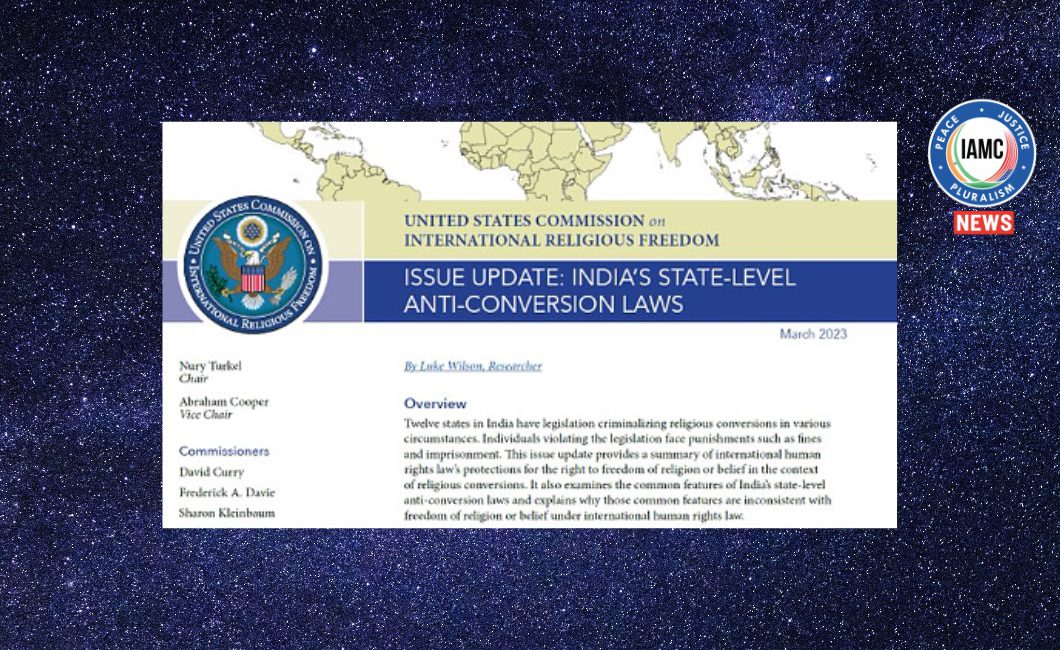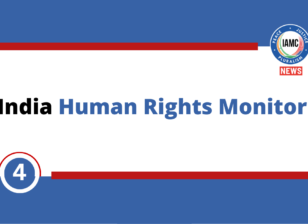USCIRF says India’s anti-conversion laws violate international human rights law
India’s laws criminalizing religious conversion and interfaith marriage, also known as anti-conversion laws, are a violation of international human rights law, said the US Commission for International Religious Freedom (USCIRF) in a newly released report.
USCIRF is a federal government commission that reviews human rights abuses and the suppression of religious freedom of countries worldwide. India has been highlighted several times by USCIRF as engaging in particularly egregious abuses against religious minorities.
The commission’s new report, titled “Issue Update: India’s State-Level Anti Conversion Laws,” strikes back against the ruling Hindu supremacist Bharatiya Janata Party (BJP) government’s claims that the law only prevents coerced conversion.
“India’s state-level anti-conversion laws prohibit conversions under circumstances that go beyond coercion, using broad and vague language that can be used to target voluntary religious conversions,” the report said.
“India’s enforcement of state-level anti-conversion laws suggests the legislations’ intent is to prevent conversions to disfavored religions—such as Christianity and Islam— and not to protect against coerced conversions.”
“These prohibitions violate international human rights law’s guarantee that individuals have the freedom to change their religious beliefs,” USCIRF reported.
Twelve out of 28 states in India have implemented anti-conversion laws, leading to the increased harassment and violence against minorities. In particular, Muslim men are subject to violence if they are seen interacting with Hindu women, and Christians as a whole are targeted over claims of forcing Hindus to convert to Christianity.
Journalism bodies warn RSS-affiliated media takeover will kill neutral journalism
The National Alliance of Journalists (NAJ) and the Delhi Union of Journalists (DUJ) have warned that neutral, independent journalism is in serious danger after a news agency backed by the nation’s most notorious Hindu supremacist paramilitary group was contracted to supply news to India’s public broadcaster.
The Rashtriya Swayamsevak Sangh (RSS), a Hindu paramilitary group whose members have an extensive history of anti-minority violence and glorifying Nazis, backs a little-known news agency called Hindusthan Samachar.
In a clear move to establish Hindu supremacist narratives as the mainstream, Hindusthan Samachar was chosen over established and reputable agencies to provide news to public broadcasters owned by the Indian government.
“This move … will saffronise (Hinduize) news in India to suit the ruling party and kill neutral and independent journalism. Hindusthan Samachar was born in 1948 to manufacture consent in favour of the RSS ideology, which dominates in the current ruling dispensation,” said NAJ and DUJ in a joint statement.
“The move to give it the role of primary news supplier to the nation will further saffronise, communalise and polarise Indian society and politics,” the groups stated.
Since the election of Prime Minister Narendra Modi, India’s democratic institutions have collapsed under the influence of the Hindu supremacist movement. A free and independent media is one of many casualties of the Modi regime’s push for a fascist and Hindu supremacist India.
Journalist arrested for asking BJP leader questions about unfulfilled promises
As part of India’s ongoing crackdown on a free press and any form of criticism against the ruling party, a journalist in Uttar Pradesh state was arrested for asking a BJP leader questions about unfulfilled promises.
In a video of the incident, journalist Sanjay Rana can be heard questioning state minister for secondary education Gulab Devi, asking her why she had not fulfilled several promises to improve infrastructure.
“Villagers tried to build pressure on these issues, but you never listened to them. What have you got to say about this?” he asked.
After the video went viral on social media, another BJP leader, Shubham Raghav, filed a police report against the journalist accusing him of “criminal intimidation” and “intent to provoke breach of the peace,” leading to his swift arrest.
Despite the judicial harassment, Rana has stood by his questions to Devi.
“I have not done anything wrong,” he said. “If someone is making false statements about the work they have done, shouldn’t you question it?”
Rana’s arrest is in stark contrast to the glaring lack of action taken against Hindu supremacists who openly threaten minorities and encourage violence.



